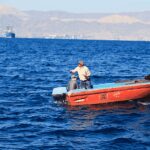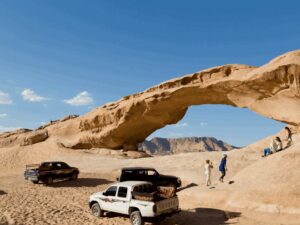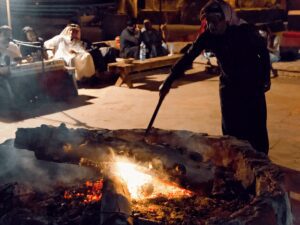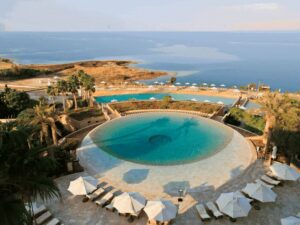Amman, Jordan—In a pioneering endeavor, the American Center of Research (ACOR) recently hosted an illuminating lecture by its Executive Director, Pearce Paul Creasman, shedding light on the latest archaeological discoveries from the Dead Sea site of Kallirhoe (modern ‘Ain ez-Zara). The lecture, held on Monday, showcased the outcomes of a comprehensive survey and exploratory excavation conducted during the autumn of 2023.
In collaboration with the Department of Antiquities, ACOR spearheaded an ambitious excavation campaign in Kallirhoe, with a primary focus on the ancient port that serviced the citadel of Machaerus (Mukawer). Dating back to at least the Hasmonean period, this port has been depicted on historical maps, including the renowned Madaba map from the 6th century AD.
The lecture provided insights into the multifaceted archaeological endeavors undertaken both on land and underwater, with a particular highlight being the inaugural in-person underwater survey in the Dead Sea. Despite encountering logistical challenges and unforeseen conditions, the mission yielded invaluable discoveries, enriching our understanding of this ancient site.
The Dead Sea’s rejuvenating springs have drawn civilizations for millennia, with early kingdoms such as the Nabataeans and Hasmoneans frequenting the area for therapeutic treatments. Creasman underscored the significance of maritime travel in the region, noting the absence of ancient roads along the Dead Sea’s eastern shore. Consequently, harbors like the one at Kallirhoe played a pivotal role in connecting settlements and facilitating trade.
Thanks to recent support from the Jordanian government, ACOR collaborated with the Department of Antiquities to revisit the site, conducting meticulous examinations and documentation of various archaeological complexes. Of particular interest was the hill of the harbor, where previous surveys had identified intriguing features submerged beneath the water.
Undertaking underwater excavations posed unique challenges, including the absence of established protocols for diving in the Dead Sea. Divers equipped with specialized gear navigated treacherous salt cliffs and encountered phenomena unique to the region’s extreme environment. Despite the risks, the excavation marked a significant milestone, representing the first-ever underwater archaeological endeavor in the Dead Sea.
Analysis of the discovered features, ranging from natural formations to potential ancient structures, offers tantalizing prospects for further research. Creasman expressed optimism about unraveling more mysteries of the site in future excavations, leveraging cutting-edge techniques and interdisciplinary collaboration.
As ACOR’s Executive Director, Creasman brings a wealth of expertise in Middle Eastern and North African heritage, archaeology, and environmental studies. With a distinguished academic background and numerous accolades, including recognition from prestigious institutions, Creasman continues to spearhead groundbreaking initiatives in archaeological research and preservation.







